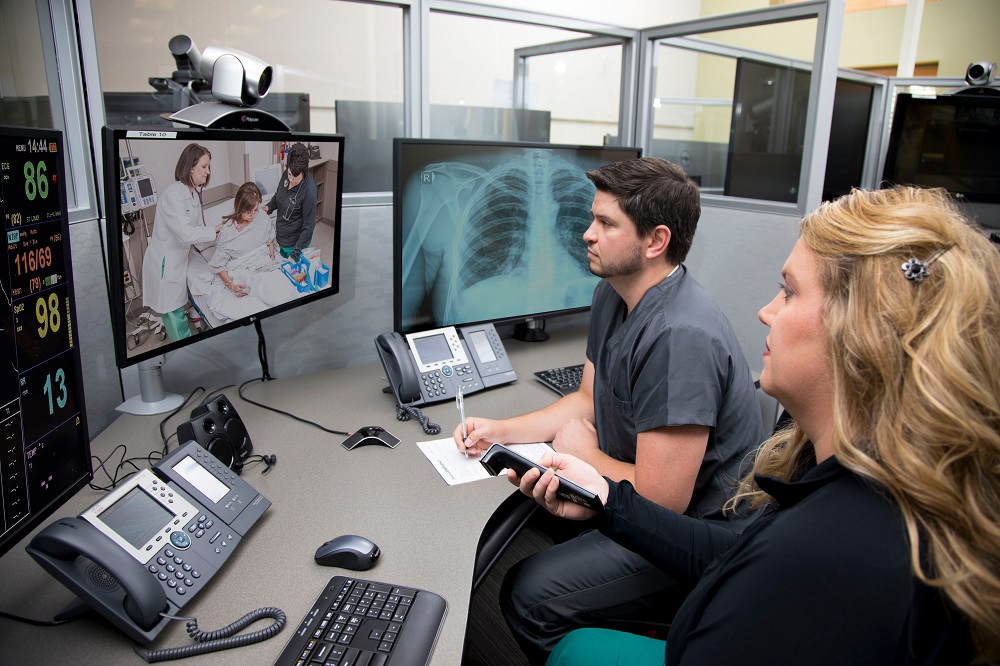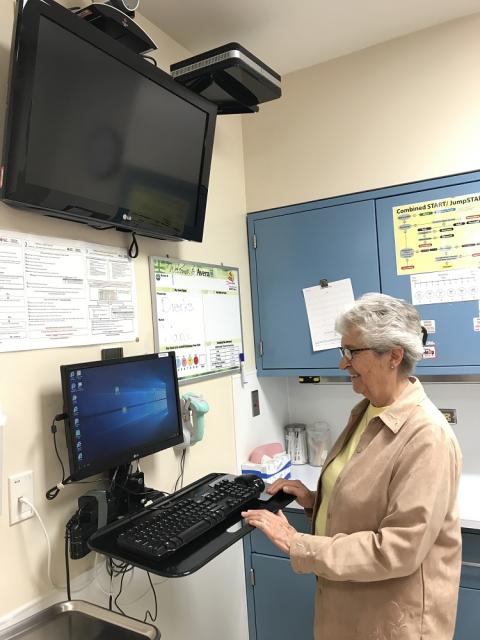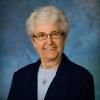
Dr. Matthew Nipe, Avera emergency specialist, and Mandy Bell, innovation officer for Avera eCARE, use the Avera eCARE system in Sioux Falls, South Dakota. (Courtesy of Avera / Donna Ferris)
On a warm June evening in 2016, a group of 4-H youth and their parents were traveling on a remote country road to a farm in Montana. Two girls were riding a side-by-side all-terrain vehicle behind the caravan and began to lag behind. Worried, one car turned back to find them and discovered the ATV overturned in a ditch with Fera, one of the girls, pinned underneath.
Three men from the group pulled the ATV away while someone else placed a 911 call to the nearest rural hospital in Plentywood, Montana. Fera and her parents drove 20 minutes to the highway to meet the ambulance, which would still travel another 30 minutes to the hospital. Fera was in crisis, gasping for air from collapsed lungs.
Before Fera arrived, staff at the hospital in Plentywood had established a video connection with a specialist at Avera eCARE Emergency in Sioux Falls, South Dakota, who remotely guided the Plentywood staff on the medical treatment plan they should use with Fera.
Melissa, Fera's mother, was in a panic, seeing a doctor only on video. She feared the worst, wondering how effective such a long-distance intervention could be. However, the eCARE doctor was calm and assisted the emergency staff to get Fera's lungs functioning and stabilized. She was flown to St. Vincent Healthcare in Billings, Montana, where she stayed for two weeks, receiving care for spinal fractures and injuries to her ribs, jaw, shoulder blades and arm.
Without the aid of telemedicine, Fera would not have survived. Her out-of-the-ordinary experience in the "middle of nowhere" was made possible through a collaborative venture between two rural-based congregations of sisters, the Presentation Sisters of the Blessed Virgin Mary from Aberdeen, South Dakota, and the Benedictine Sisters from Yankton, South Dakota. In 2000, they merged their congregational health systems, started as single hospitals in 1901 and 1897, respectively, into Avera Health so rural health care could continue in that part of the Midwest. Together, they provide hands-on hospital and clinic health care in five states and virtually by telemedicine in over 30 states.
An old proverb says, "Necessity is the mother of invention," and that is what makes Avera unique: Providing health care in rural areas takes constant innovation. As rural hospitals became less and less sustainable, often because of lower and lower reimbursement income, something had to be done to provide health care for the people living in the "middle of nowhere." Avera Health's telemedicine and virtual eCARE programs answered the need and have continued to develop since its inception, celebrating its one millionth patient in 2016.
Praying and reflecting on this history, in a real "yes" moment, I saw clearly that the growth of the program can be compared to the parable of the mustard seed: "It is the smallest of all the seeds, but when it has grown, it is the greatest of shrubs and becomes a tree, so that the birds of the air come and make nests in its branches."
To my knowledge, this parable has not been connected with Avera. Maybe this is a new understanding of Avera's deep connection with the Gospel values referenced in its mission statement.
The seed was planted in 1993, when two hospitals in Sioux Falls and Flandreau, South Dakota, designed a pilot project establishing a shared digital medical record system. From this developed virtual electronic delivery of care. The program attracted many rural communities and spread to health institutions in over 30 states.
Advertisement
A virtual specialty clinic, one of the first of such programs in the U.S., used video and audio links to allow patients and rural caregivers outside of Sioux Falls to meet and consult with a specialist, assisted by local clinic staff. Eventually, services expanded to include emergency care, intensive care, pharmacy, senior care, correctional and behavioral health, and school health. Doctors, nurses, social workers, pharmacists and specialists are available 24 hours a day. Just pushing a button from a distant place can bring these health care professionals together to provide services for complex and acute health care needs in rural areas.
As a registered nurse, I served in our congregational health ministry as senior vice president for mission and board member for the Avera System for over 30 years. I got to visit and evaluate the rural health centers where eCARE is operating. These programs, which alleviate oppression and promote human dignity in some of the most isolated rural communities, clearly flow from the charisms and missions of the Benedictine and Presentation sisters. Both congregations remain involved in making sure their charisms are understood and carried out.
August marked 60 years since I graduated from basic nursing school. As a nurse providing direct care to patients, I had to create medical records by hand. Multiple handwritten pages and graphs (with the added difficulty of deciphering doctors' penmanship) made it a challenge to provide quality care. Technology has made all of this easier in many ways while also challenging us with an ongoing learning process. Another challenge for nurses and caregivers using electronic medical records is maintaining confidentiality for patients and families. They also have to balance the use of technology with personal care and spending time with and listening to patients and families.

Presentation Sr. Mary Jaeger with the technology for telemedicine at Avera St. Anthony's Hospital in O'Neill, Nebraska, where she ministered for six years. (Provided photo)
Pastoral care departments were not yet established 60 years ago, and I remember having the privilege of being with patients who were dying — as nurses, we also learned and provided pastoral care along with nursing care. Being with the dying was scary at first as a student or new graduate. But my nurse partners and mentors and I grew into this and learned how to pray with and for patients and families.
Listening to patients and families and being led by the Holy Spirit brought a level of comfort with this responsibility. For me at this time, spiritual care became integrated with daily nursing care. Even with pastoral care departments, nurses still have a major role in making sure spiritual needs are met. Spiritual care is now included in the curriculum for nursing students, who strive to provide holistic care: physical, spiritual and emotional.
To keep our charisms alive, all 19,000 employees are oriented to understand Avera's gospel values of compassion, hospitality and stewardship, and they are called to live out these values in their daily work and interactions. Avera's leaders regularly take part in Avera's mission leadership development to keep "missional thinking" alive and cascading through all levels of staff.
The application process for employment also determines the ability of each candidate to live the values of compassion, hospitality and stewardship. A carefully structured program of internalizing the values is continuous. That small mustard seed is nurtured and continues to grow in each of us sisters and our partners, the Avera Presentation people and Benedictine associates.
[Sr. Mary Jaeger is a Sister of the Presentation of the Blessed Virgin Mary of Aberdeen, South Dakota. She is an Avera Health board member and is engaged in various volunteer ministries for Avera, the Avera Heart Hospital, and St. Michael Parish.]





